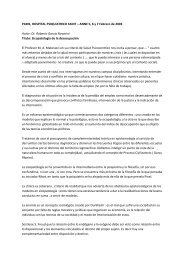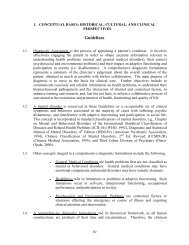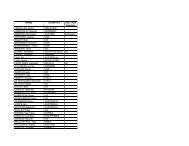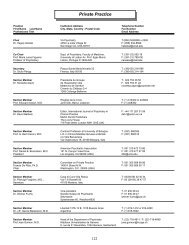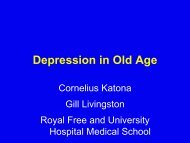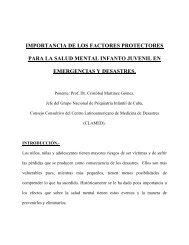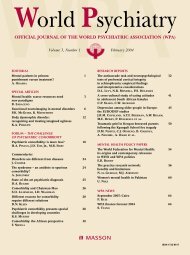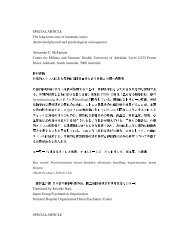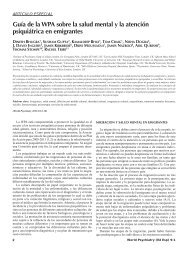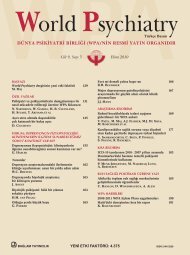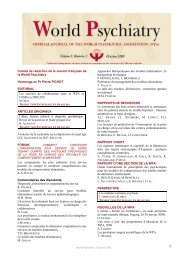- Page 1 and 2:
P World Psychiatry OFFICIAL JOURNAL
- Page 3:
WORLD PSYCHIATRIC ASSOCIATION INTER
- Page 6 and 7:
RS2. New advances in diffusion magn
- Page 8 and 9:
SW8. Treatments for pregnant women
- Page 10 and 11:
cologic treatment options are now a
- Page 12 and 13:
elation to particular treatments an
- Page 14 and 15:
chotherapy (TFP), an outgrowth of p
- Page 16 and 17:
obtaining open employment. Secondar
- Page 18 and 19:
tion of diagnosis-specific suicide
- Page 20 and 21:
US7. ADVANCES IN THE MANAGEMENT OF
- Page 22 and 23:
those following birth. Very little
- Page 24 and 25:
US12. ADVANCES IN THE MANAGEMENT OF
- Page 26 and 27:
US14.2. COMMON AND RARE GENETIC VAR
- Page 28 and 29:
cause within 12 months was 63 (Kapl
- Page 30 and 31:
US19. ADVANCES IN THE MANAGEMENT OF
- Page 32 and 33:
sentations, and the onset of effica
- Page 34 and 35:
US23.3. NEUROGENETIC MECHANISMS OF
- Page 36 and 37:
and physical disorders meets proble
- Page 38 and 39:
parent-child relationship. A ration
- Page 40 and 41:
specifically, these studies have ei
- Page 42 and 43:
RS3.5. USING ANTIDEPRESSANTS (PLUS
- Page 44 and 45:
BOLD signal differences in prefront
- Page 46 and 47:
affective states and to increase in
- Page 48 and 49:
account for over fifty per cent of
- Page 50 and 51:
sequencing of the pathway to care o
- Page 52 and 53:
RS14.2. OBSESSIVE-COMPULSIVE DISORD
- Page 54 and 55:
RS16. SUPPORTED EMPLOYMENT FOR PEOP
- Page 56 and 57:
RS18. CURRENT STATE AND FUTURE PROS
- Page 58 and 59:
RS20. BRAIN SYSTEMS AND PSYCHOSIS R
- Page 60 and 61:
andomly recruited from the Montpell
- Page 62 and 63:
model requires a conceptual shift f
- Page 64 and 65:
familiar with psychological vulnera
- Page 66 and 67:
RS26.5. IMPLICATIONS OF RECOVERY: A
- Page 68 and 69:
cotherapy, remain unclear. These ar
- Page 70 and 71:
RS30.2. COMBINATION THERAPIES FOR P
- Page 72 and 73:
RS32.2. CHRONOTHERAPEUTICS TO TREAT
- Page 74 and 75:
RS34. THE EFFECTS OF PSYCHIATRIC CO
- Page 76 and 77:
teristics than an African American
- Page 78 and 79:
WO6. MANAGEMENT OF MENTALLY DISORDE
- Page 80 and 81:
WO14. PRACTICAL ISSUES IN THE LONG-
- Page 82 and 83:
espectively; for women with any psy
- Page 84 and 85:
SS3. THE ASSOCIATION BETWEEN IMPULS
- Page 86 and 87:
and blood samples were used for tol
- Page 88 and 89:
(the need to avoid harm to a patien
- Page 90 and 91:
SS9. IMPLEMENTING MENTAL HEALTH CAR
- Page 92 and 93:
SS11. RECOVERY BEYOND RHETORIC (org
- Page 94 and 95:
Romanian admission to the European
- Page 96 and 97:
SS14.2. SUBJECT-SPECIFIC EEG ANALYS
- Page 98 and 99:
SS16. HOPE IN PSYCHIATRY (organized
- Page 100 and 101:
SS18. TOWARDS A CONSENSUS ON ETHICS
- Page 102 and 103:
duced drugs that were marketed as a
- Page 104 and 105:
treated for unipolar and bipolar de
- Page 106 and 107:
long-term individual therapy, the t
- Page 108 and 109:
provide a defence or to accept a de
- Page 110 and 111:
SS28.2. DOCTORS’ HEALTH AND ADDIC
- Page 112 and 113:
SS30.3. EVIDENCE-BASED PSYCHOTHERAP
- Page 114 and 115:
has created a unique challenge for
- Page 116 and 117:
SS35. ACCESS TO MENTAL HEALTH CARE:
- Page 118 and 119:
SS36.3. BEHAVIOURAL AND COGNITIVE-B
- Page 120 and 121:
SS38.2. DEPRESSION AND DEMENTIA: LE
- Page 122 and 123:
need to show what it is doing to ad
- Page 124 and 125:
the individual’s personhood (in e
- Page 126 and 127:
taken into account and mood disorde
- Page 128 and 129:
and psychiatric services at all lev
- Page 130 and 131:
chose the field of psychoneuroimmun
- Page 132 and 133:
ices to families (particularly chil
- Page 134 and 135:
suffer from comorbid depression. In
- Page 136 and 137:
American countries, that the majori
- Page 138 and 139:
ZS10.5. STIGMA IN UKRAINE AND POST-
- Page 140 and 141:
chotherapeutic schools, such as the
- Page 142 and 143:
NRS2. GENETICS AND MOLECULAR BIOLOG
- Page 144 and 145:
NRS3.2. EARLY DETECTION AND INTERVE
- Page 146 and 147:
NRS4.4. DEPRESSIVE PERSONALITY AND
- Page 148 and 149:
patients were enrolled; 38 were ran
- Page 150 and 151:
NRS7.2. THE USE OF THE MOOD DISORDE
- Page 152 and 153:
What were the missed opportunities
- Page 154 and 155:
compared with those without rapid c
- Page 156 and 157:
and poor control of impulsivity. Th
- Page 158 and 159: tainty, which, in turn makes it pos
- Page 160 and 161: they “did not want anyone to know
- Page 162 and 163: the SOHO studies and followed up to
- Page 164 and 165: occurring in the brain during REM s
- Page 166 and 167: (28.6%/44.0%), and after 12 months
- Page 168 and 169: adverse events (AEs). Eighty-one pa
- Page 170 and 171: and worse global functioning (as ev
- Page 172 and 173: ment response is defined primarily
- Page 174 and 175: domized to treatment with either us
- Page 176 and 177: PO1.56. RISPERIDONE AND HYPERPROLAC
- Page 178 and 179: understanding and self-awareness (4
- Page 180 and 181: five healthy subjects, genotyped fo
- Page 182 and 183: patients and their relatives, the a
- Page 184 and 185: PO1.86. VALACYCLOVIR-ASSOCIATED PSY
- Page 186 and 187: effects of prenatal selective serot
- Page 188 and 189: of these recovered patients, 10% re
- Page 190 and 191: assess functional impairment. The F
- Page 192 and 193: to recurrence of any mood event was
- Page 194 and 195: demonstrated that declined group ha
- Page 196 and 197: PO1.130. ARIPIPRAZOLE IN ACUTE MANI
- Page 198 and 199: in maintenance therapy could be the
- Page 200 and 201: PO1.145. BIPOLAR DISORDER WITH A DE
- Page 202 and 203: the Consort Statement guidelines. R
- Page 204 and 205: for evaluation and a diagnosis of t
- Page 206 and 207: PO1.170. EVALUATION OF LIOTHYRONINE
- Page 210 and 211: sistencies among magnetic resonance
- Page 212 and 213: suppression of the immune system in
- Page 214 and 215: isk factor unique to this populatio
- Page 216 and 217: went functional magnetic resonance
- Page 218 and 219: study we generated the stable MES23
- Page 220 and 221: control group from the general popu
- Page 222 and 223: PO2.14. AUGMENTATION WITH COGNITIVE
- Page 224 and 225: PO2.22. FREQUENCY AND CLINICAL CORR
- Page 226 and 227: CI -0.75; -0.14, p=0.004). In addit
- Page 228 and 229: PO2.38. SPECTRUM OF SOCIAL ANXIETY
- Page 230 and 231: PO2.46. CLINICAL HETEROGENEITY OF O
- Page 232 and 233: studies are needed in order to iden
- Page 234 and 235: alexithymia was observed in IBD, bu
- Page 236 and 237: three time points (baseline, 12 and
- Page 238 and 239: PO2.80. PERCEIVED FAMILY CONFLICTS
- Page 240 and 241: PO2.88. BODY IMAGE IN A CLINICAL SA
- Page 242 and 243: tions of self and others. These fea
- Page 244 and 245: and socioeconomic status, we constr
- Page 246 and 247: incipient during late adolescence a
- Page 248 and 249: PO2.120. DEMOGRAPHIC AND CLINICAL F
- Page 250 and 251: jective scale, there was significan
- Page 252 and 253: PO2.137. SURVEY OF AN ALCOHOL SUPPO
- Page 254 and 255: PO2.145. PATHOLOGICAL GAMBLING IN P
- Page 256 and 257: eceptor subtypes. To understand bet
- Page 258 and 259:
PO2.160. TYPOLOGY OF BEHAVIOR PROFI
- Page 260 and 261:
ADHD and 25 healthy controls were a
- Page 262 and 263:
PO3.10. METHYLPHENIDATE TRANSDERMAL
- Page 264 and 265:
aripiprazole (15 mg/die), with dram
- Page 266 and 267:
PO3.26.2 IMPROVEMENTS IN MENTAL HEA
- Page 268 and 269:
health care settings to better meet
- Page 270 and 271:
children with or without MDD, and t
- Page 272 and 273:
shoulder pain unresponsive to non-s
- Page 274 and 275:
PO3.58. EFFICACY OF LAMOTRIGINE IN
- Page 276 and 277:
(mean 25.4-point change) and vitali
- Page 278 and 279:
PO3.74. PSYCHIATRIC COMORBIDITY IN
- Page 280 and 281:
in whom this type of intervention m
- Page 282 and 283:
PO3.91. EFFECTIVENESS OF PSYCHOEDUC
- Page 284 and 285:
ment choices. A 13-item questionnai
- Page 286 and 287:
onset of depression, patients with
- Page 288 and 289:
did not, also had poorer mental hea
- Page 290 and 291:
lized a comparison group, and exami
- Page 292 and 293:
PO3.133. PATTERNS OF CARE IN PATIEN
- Page 294 and 295:
PO3.140. DRUG NON-COMPLIANCE: THE I
- Page 296 and 297:
who were living part or full time w
- Page 298 and 299:
developed by a task force appointed
- Page 300 and 301:
lyzed using a modified grounded the
- Page 302 and 303:
PO3.174. THE EMILIA PROJECT: THE ST
- Page 304 and 305:
ecovered better from depression tha
- Page 306 and 307:
students of the Islamic Azad Univer
- Page 308 and 309:
individualized treatment plan, taki
- Page 310 and 311:
side effects), and reaching an effe
- Page 312 and 313:
models of circadian disturbances. M
- Page 314 and 315:
tinuous antipsychotic protection. T
- Page 316 and 317:
SPS9.5. IMPROVING CARDIOVASCULAR HE
- Page 318 and 319:
although preliminary, are promising
- Page 321 and 322:
INDEX OF AUTHORS Abbate A. 270 Abde
- Page 323 and 324:
Benítez-Hernández M.M. 297 Benito
- Page 325 and 326:
Centanaro F. 164 Cercignani M. 32 C
- Page 327 and 328:
Diez T. 164 Dimitrijevic I. 244 Din
- Page 329 and 330:
Gates D. 280 Gaviria S.L. 73 Gelao
- Page 331 and 332:
Hua-Min Xu 210 Huang H. 247 Huang J
- Page 333 and 334:
Kundi P.S. 257 Kunugi H. 248 Kupfer
- Page 335 and 336:
Marder S.R. 103 Margari F. 274, 275
- Page 337 and 338:
Napo F. 175 Narayana P.A. 76 Nardi
- Page 339 and 340:
Pieper S. 31 Pierantozzi E. 193 Pie
- Page 341 and 342:
Rybakowski J. 171 Ryder A.G. 138 Ry
- Page 343 and 344:
Stoduto G. 280 Stone M.H. 5, 38 Sto
- Page 345 and 346:
Villaseñor Bayardo S. 118 Vinberg
- Page 347:
© 2009 by WPA Printed in Italy by




